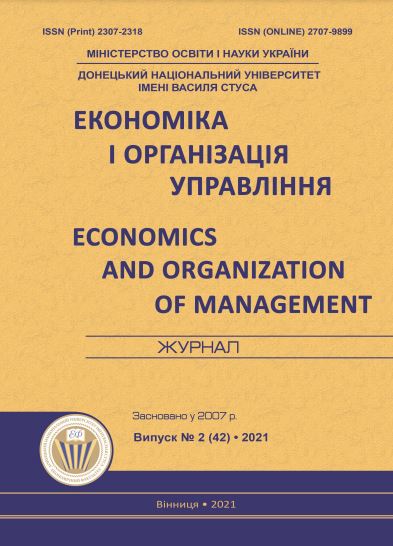The mitigation of brain waste & brain drain migration in Ukraine: convergence of economic and educational transformations
DOI:
https://doi.org/10.31558/2307-2318.2021.2.5Keywords:
migration; brain drain; brain wasteAbstract
The article considers such concepts as brain drain and brain waste and analyzes the current state of professional migration in Ukraine. Brain drain is a phenomenon that describes the migration of highly skilled people to more developed countries caused by globalization, economic imbalances in the world, and the policies of developed countries. Brain loss is a phenomenon that describes the complete or partial loss of competence by a person during working in a position that does not correspond to his or her qualification level.
Migration trends in Ukraine were analyzed. The flow of students studying abroad is increasing due to exchange programs and international projects. Regarding professional migration, the main countries that accept emigrants from Ukraine are neighboring Russia and Poland, which coincides with global trends, according to which people most often migrate to neighboring countries with more developed economies.
The article also provides examples of combating the effects of brain drain and brain waste in different countries. Ways to reduce the consequences of these can be tax policy improvements, monetary incentives for scientists, or stimulating the economy, for example, through coopetion between universities, government, and business.
References
Global Flow of Tertiary-Level Students (2021) UNESCO UIS Database. Retrieved from: uis.unesco.org/en/uis-student-flow#slideoutmenu.
Bartolini, L., Gropas, R., & Triandafyllidou, A. (2017). Drivers of highly skilled mobility from Southern Europe: escaping the crisis and emancipating oneself. Journal of Ethnic and Migration Studies, 43(4), 652-673.
Beine, M., Docquier, F., & Rapoport, H. (2001). Brain drain and economic growth: theory and evidence. Journal of development economics, 64(1), 275-289.
Carr, S. C., Inkson, K., & Thorn, K. (2005). From global careers to talent flow: Reinterpreting ‘brain drain’. Journal of world business, 40(4), 386-398.
Demographic and social statistics/Population and migration (2021). Database of State Statistic Service of Ukraine. Date of last modification 31st of May, 2021. Retrieved from: ukrstat.org/uk/operativ/menu/menu_u/ds.htm.
Docquier, F., & Rapoport, H. (2012). Globalization, brain drain, and development. Journal of economic literature, 50(3), 681-730.
Iredale, R. (2001). The migration of professionals: theories and typologies. International migration, 39(5), 7-26.
Mahroum, S. (2000). Highly skilled globetrotters: mapping the international migration of human capital. R&D Management, 30(1), 23-32.
Marx, M., Singh, J., & Fleming, L. (2015). Regional disadvantage? Employee non-compete agreements and brain drain. Research Policy, 44(2), 394-404.
Mattoo, A., Neagu, I. C., & Özden, Ç. (2008). Brain waste? Educated immigrants in the US labor market. Journal of development economics, 87(2), 255-269.
Meyer, J. B. (2001). Network approach versus brain drain: lessons from the diaspora. International migration, 39(5), 91-110.
Mountford, A. (1997). Can a brain drain be good for growth in the source economy? Journal of development economics, 53(2), 287-303.
Özden, Ç. G. (2006). Educated migrants: is there brain waste?. REMITTANCES &, 227.
Pires, A. J. G. (2015). Brain drain and brain waste. Journal of Economic Development, 40(1), 1-34.
Shvindina H., Lyeonov S. The Key Features of Labour Migration Processes in Ukraine. New Trends and Best Practices in Socioeconomic Research : III International Science Conference SER 2020, Igalo (Herceg Novi), Montenegro, September 17th – 19th, 2020. Montenegro : University Mediterranean, 2020. P. 71.
Van Der Wende, M. (2015). International Academic Mobility: Towards a Concentration of the Minds in Europe. European Review, 23(S1), S70-S88. doi:10.1017/S1062798714000799
Vorontsova, A., Shvindina, H., Petrushenko, Y., & Hordiienko, V. (2020). Reforming the education system to prevent labor migration. Knowledge and Performance Management, 4, 52-66. DOI:10.21511/kpm.04(1).2020.05

